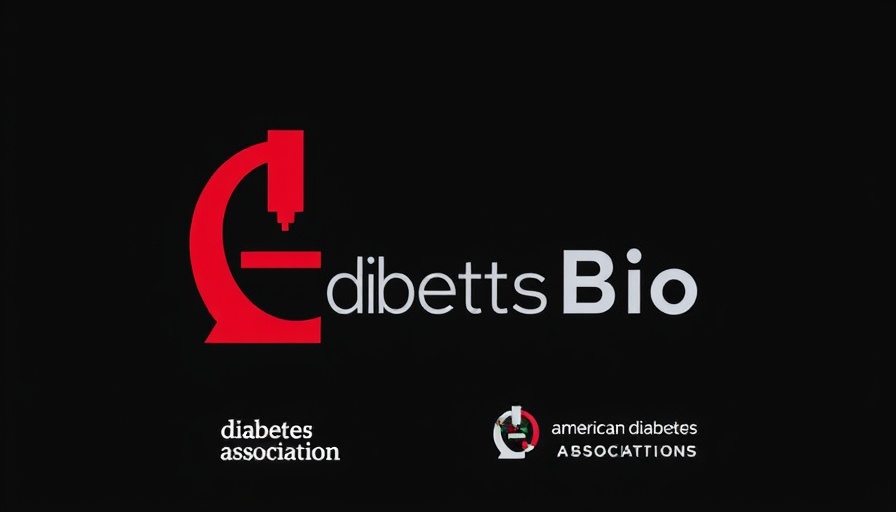
The Complex Relationship Between Glucagon Receptor Deficiency and Diabetes
The rising incidence of diabetes, particularly type 2, has drawn significant attention from health professionals and researchers alike. Among the myriad factors influencing diabetes development, glucagon receptor deficiency has emerged as a crucial area of study. This deficiency can lead to early-onset hepatic steatosis—a condition increasingly recognized in patients with metabolic disorders, particularly those with pre-diabetes and diabetes.
In the video ‘Cacciottoloon on glucagon receptor deficiency & early-onset hepatic steatosis’, the topic of glucagon's impact on diabetes is explored, which prompted a deeper analysis of the complexities surrounding this condition.
Understanding Glucagon and Its Role in Metabolism
Glucagon is a peptide hormone produced by the alpha cells of the pancreas. It plays a vital role in glucose metabolism, primarily by raising blood glucose levels when they fall too low. In individuals with glucagon receptor deficiency, this regulation is impaired, potentially leading to significant metabolic disturbances. The implications of glucagon signaling extend beyond glucose homeostasis, intersecting with fat metabolism, which may cause hepatic fat accumulation or steatosis.
Early-Onset Hepatic Steatosis: A Prevalent Concern
Early-onset hepatic steatosis, characterized by excessive fat buildup in the liver, presents unique challenges for individuals with diabetes and pre-diabetes. Current research highlighted in the video “Cacciottoloon on glucagon receptor deficiency” delves into the underlying mechanisms, suggesting that glucagon receptor deficiency can exacerbate hepatic lipid accumulation. This correlation emphasizes the need for targeted interventions focused on metabolic pathways affected by glucagon signaling.
Navigating Nutrition Strategies for Diabetic Patients
Dietary management is paramount for controlling blood sugar and preventing complications. For individuals grappling with diabetes and pre-diabetes, nutritionists and diabetes counselors play essential roles in creating personalized dietary plans. These plans often focus on low glycemic index foods to help control blood sugar levels and promote weight management, critical for preventing hepatic steatosis.
The Role of Healthcare Professionals in Diabetes Management
Diabetes doctors, nutritionists, and nurses are front-line warriors in the fight against diabetes. Their insights into patient management—combining medical support with effective nutrition strategies—are crucial in mitigating complications associated with glucagon receptor deficiency and hepatic steatosis. Regular check-ups and tailored diabetes education empower patients with knowledge, equipping them to make informed health decisions.
Social Connections and Emotional Support in Managing Diabetes
Beyond medical and nutritional interventions, social support networks remain vital for those managing diabetes. Engaging with diabetes support groups can foster a sense of community. Sharing experiences with individuals who understand the day-to-day challenges of effectively managing blood glucose levels and potential complications can be incredibly beneficial.
Future Directions: Research and Insights on Diabetes Management
The ongoing exploration of glucagon receptor deficiency shines a light on the need for more targeted therapies. Early research indicates that addressing glucagon signaling pathways may lead to innovative treatments, enhancing patient outcomes. As our understanding grows, so too does the potential for breakthroughs that can significantly alter the trajectory of metabolic diseases.
Actionable Insights for Healthcare Professionals
As research progresses, healthcare professionals must remain informed and adapt their practices to incorporate the latest findings. Considerations such as genetic predispositions, lifestyle factors, and personalized care strategies can significantly impact patient outcomes. Regularly revisiting care protocols ensures alignment with current research insights and best practices.
In conclusion, understanding glucagon receptor deficiency and early-onset hepatic steatosis provides valuable insights into managing diabetes and pre-diabetes effectively. Engaging with healthcare professionals to create comprehensive care strategies is essential in navigating this complex relationship. With emerging research paving the way for new treatment approaches, the future of diabetes management appears promising.
 Add Row
Add Row  Add
Add 




Write A Comment